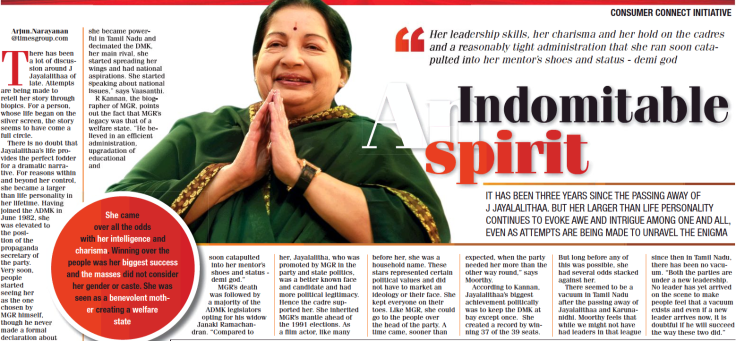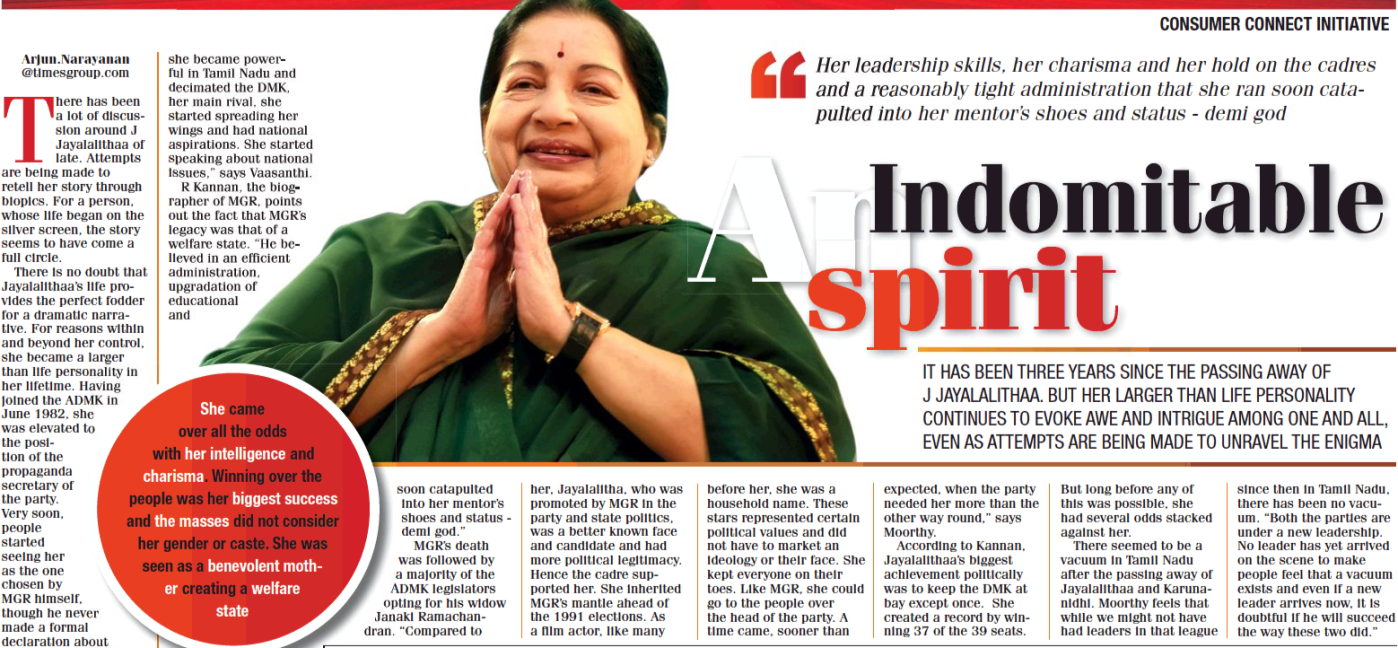
There has been a lot of discussion around J Jayalalithaa of late. Attempts are being made to retell her story through biopics. For a person, whose life began on the silver screen, the story seems to have come a full circle.
There is no doubt that Jayalalithaa’s life provides the perfect fodder for a dramatic narrative. For reasons within and beyond her control, she became a larger than life personality in her lifetime. Having joined the ADMK in June 1982, she was elevated to the position of the propaganda secretary of the party. Very soon, people started seeing her as the one chosen by MGR himself, though he never made a formal declaration about it. Many wondered if she could step into the shoes of a man who was a demi-god in Tamil Nadu.
Vaasanthi, who wrote a biography of Jayalalithaa attributes her success to her intelligence and charisma. “When she became the propaganda secretary pf the party, she got in touch with the cadre and the workers directly. She was extremely charismatic and they had already loved her as actress. They believed she was the chosen one by MGR, a man whom they all loved, though he did not choose any heir. Wherever she went, the crowds came to see her,” she says.
Many factors contributed to her larger-than-life persona. According to N Sathiya Moorthy, sistinguished fellow and head of Chennai initiative, Observer Research Foundation, a part of it came from the north Indian political belief that she was Tamil Nadu. “That was not the case but they saw it that way. A series of political events through the 1990s, he arrest and her role in forming alliances contributed to the building of her image, which she retained and marketed,” he says.
She was also able to look at the national picture, thanks to her education and her political career. “She was convent educated and a very intelligent woman. She was conversant in English and Hindi. For the north Indian media, she was a darling. Once she became powerful in Tamil Nadu and decimated the DMK, her main rival, she started spreading her wings and had national aspirations. She started speaking about national issues,” says Vaasanthi.
R Kannan, the biographer of MGR, points out the fact that MGR’s legacy was that of a welfare state. “He believed in an efficient administration, upgradation of educational and medical sectors, a solid vote bank and good relations with the centre. Jayalalithaa initially stood on his shoulders but she came into her own after 1991 and devised her own welfare schemes. She grew stronger than MGR and became pharaoh like and she depended mostly on the civil service.”
In fact, very early in her political career, she was to be associated with a welfare scheme, when MGR made her a member of the advisory committee to oversee the noon meal scheme. “The noon meal scheme was first started by Kamarajar and taken to another level by MGR. But when Jayalalithaa came to power, she widened the scope of all welfare schemes. With schemes like offering 20kg rice to over 1.83 crore family-card holders, goats and cows for people to gain a sustained income, separate enclosures at bus stations for lactating women and bicycles to girl students, she was able to become a mother figure to the masses. As a woman she was able to think of the need to reduce the household chores of women by distributing mixers and grinders. Perhaps only a woman could have thought along these lines,” says Vaasanthi.
MGR’s death was followed by a majority of the ADMK legislators opting for his widow Janaki Ramachandran. “Compared to her, Jayalalitha, who was promoted by MGR in the party and state politics, was a better known face and candidate and had more political legitimacy. Hence the cadre supported her. She inherited MGR’s mantle ahead of the 1991 elections. Secondly, as a film actor, like many before her, she was a household name. These stars represented certain political values. They did not have to market an ideology or their face. Thirdly, something she learnt from MGR was that hers was the party of defectors from the DMK parent and she inherited MGR’s unpredictability which kept everyone on their toes. Like MGR, because of her charisma, she could go to the people over the head of the party. A time came, sooner than expected, when the party needed her,” says Sathiya Moorthy.
According to Kannan, Jayalalithaa’s biggest achievement politically was to keep the DMK at bay except once. She created a record by winning 37 of the 39 seats. But long before any of this was possible, she had several odds stacked against her. As Vaasanthi puts it, “It was a wonder that she became a powerful leader despite being a woman, an actor and a brahmin. All these three were hurdles for her. She came over all these just by her intelligence and charisma. Winning over the people was her biggest asset and the masses did not consider her gender or caste. She was seen as a benevolent queen or a mother giving all the welfare schemes.”
There seemed to be a vacuum in Tamil Nadu after the passing away of Jayalalithaa and Karunanidhi. Sathiya Moorthy feels that while we might not have had leaders in that league since then in Tamil Nadu, there has been no vacuum. “Both the parties are under a new leadership. No leader has yet arrived on the scene to make people feel that a vacuum exists and even if a new leader arrives now, it is doubtful if he will succeed the way these two did.”

Remembering the iron lady. Very good article. Not only Tamil Nadu, India miss her.
LikeLike